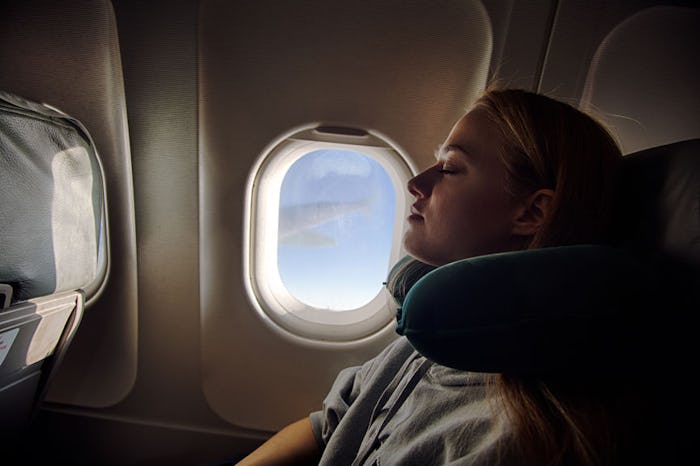Life
5 Shocking Things That Happen To Your Body Every Time You’re On A Plane
Air travel can be notoriously stressful. Even in the best of circumstances, there are some pretty intense ways that your body reacts to being on a plane. Before you add in the hassles of baggage pickup or delayed flights, the very basics of air travel can be pretty stressful on the body.
Even if you want to be a hardy, seasoned traveler, the simple mechanics of flight can just wear on you. First there's the altitude. The typical cruising altitude of a commercial jet airplane in flight is approximately 35,000 feet, according to USA Today. To put it in perspective, people can start having issues with altitude sickness at elevations of 8,000 feet, according to Healthline. Although the pressurized cabin does mitigate some of these issues, the human body is going to feel some effects when it's being hurtled through the air six miles above sea level.
With its relatively cramped quarters, lower oxygen levels, and dry air, airplane cabins can affect a person's respiratory and circulatory abilities, in addition to many other systems. So if you've ever felt kind of rough after even a routine flight, then cut yourself some slack. The pressures of being that far from the ground just have some effects, and it's totally understandable if you need a post-flight nap.
1Swollen Legs & Feet
The swelling in hands and feet that some people experience with air travel has a specific cause. "The main culprit for swollen legs and feet is gravity, in medical terms it’s called gravitational edema," says Mehran Movassaghi M.D., urologist and director of Providence Saint John’s Health Center’s Men’s Health Center. When you sit or stand for too long, blood can pool in the body's extremities. To counteract this swelling, you can take a quick walk on the plane every hour or so, stretch and flex the feet regularly, or wear compression stockings, as Dr. Movassaghi explains. If you have any medical conditions that can contribute to this swelling, then speak with your doctor about ways to make plane travel safer.
2Potential Constipation
There are many reasons you may experience this particular issue during plane travel. Change in routine, dehydration, and sitting still for too long can contribute to constipation issues while flying, says Dr. Movassaghi. To help prevent this problem, eat high fiber foods, drink plenty of water, and consider taking a stool softener, as Dr. Movassaghi explains.
3Dehydration
That arid cabin air can actually work against your health. Dry skin, dry eyes, and fatigue are just a few of the ways dehydration can affect the body, as Dr. Movassaghi explains. For people with severe respiratory diseases such as asthma, the dry air can even make breathing difficult. To ward off these unpleasant or possibly dangerous effects, it's important to stay hydrated while flying, says Dr. Movassaghi. Keeping your body hydrated is worth the annoyance of an extra bathroom trip or two.
4Oxygen Deprivation
On a plane, the amount of oxygen carried in the blood is lower than the amount of oxygen in the blood at sea level, according to the World Health Organization (WHO). Although this is usually not a serious problem for most healthy adults, people with conditions such as heart and lung diseases may require an extra oxygen supply during the flight, as further explained by the WHO.
5 Serious Pressure Changes
There's a reason why people dealing with a head cold are asked to refrain from flying. For most people, the changes in cabin pressure only result in the annoying popping sensation in the ears. But for someone with a cold, the airplane pressure changes can potentially damage your ear drums, according to WebMD. In these cases, it's often safer to let your respiratory system, as well as the rest of your body, rest safely on the ground. If this or any other health issue about flying is causing you concern, however, don't hesitate to contact your doctor for advice. Although it's a relatively safe way to travel, flying does affect the human body in some pretty significant ways.
